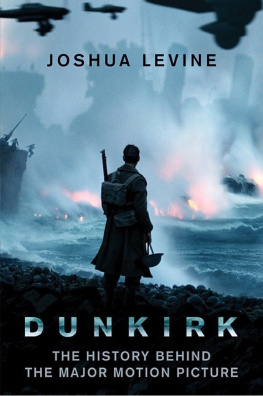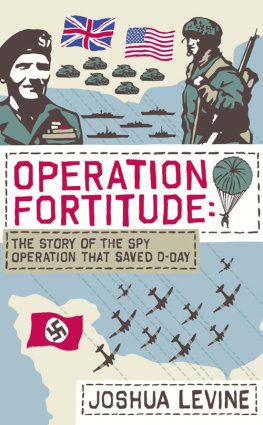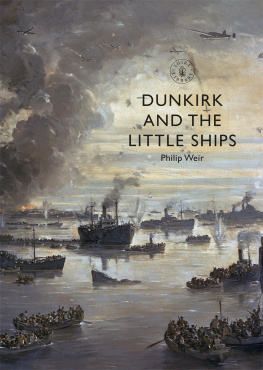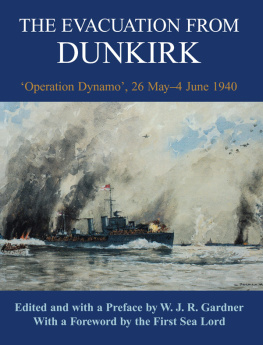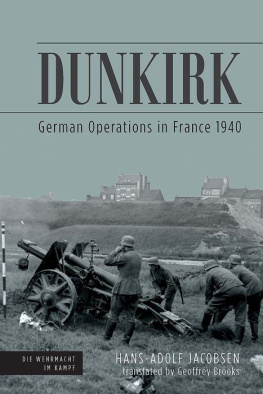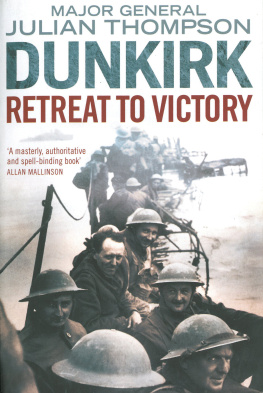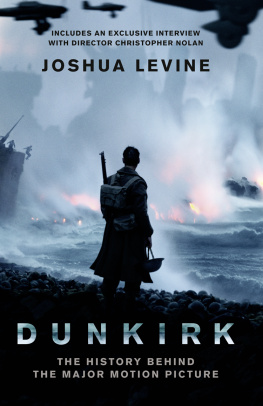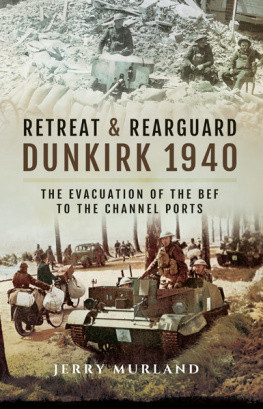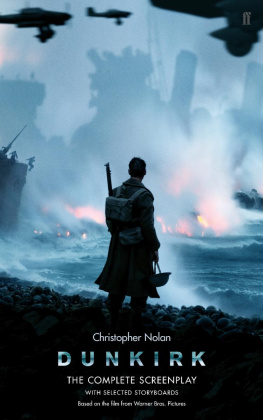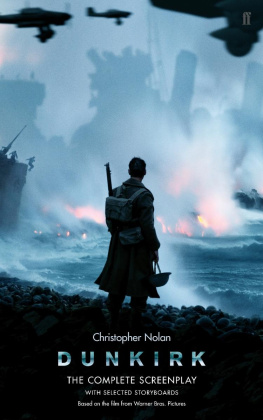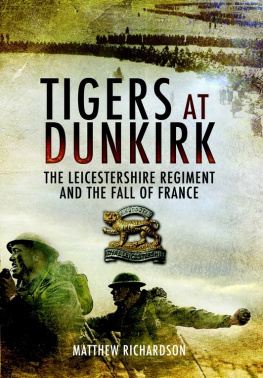FORGOTTEN
VOICES
OF
DUNKIRK
IN ASSOCIATION WITH THE
IMPERIAL WAR MUSEUM
JOSHUA LEVINE

This eBook is copyright material and must not be copied, reproduced, transferred, distributed, leased, licensed or publicly performed or used in any way except as specifically permitted in writing by the publishers, as allowed under the terms and conditions under which it was purchased or as strictly permitted by applicable copyright law. Any unauthorised distribution or use of this text may be a direct infringement of the authors and publishers rights and those responsible may be liable in law accordingly.
Version 1.0
Epub ISBN 9781407031293
www.randomhouse.co.uk
1 3 5 7 9 10 8 6 4 2
Published in 2010 by Ebury Press, an imprint of Ebury Publishing
A Random House Group Company
Introduction Peter Snow 2010
Text Joshua Levine and Imperial War Museum 2010
Photographs Imperial War Museum 2010
Joshua Levine has asserted his right to be identified as the author of this Work in accordance with the Copyright, Designs and Patents Act 1988
All rights reserved. No part of this publication may be reproduced, stored in a retrieval system, or transmitted in any form or by any means, electronic, mechanical, photocopying, recording or otherwise, without the prior permission of the copyright owner
The Random House Group Limited Reg. No. 954009
Addresses for companies within the Random House Group can be found at
www.randomhouse.co.uk
A CIP catalogue record for this book is available from the British Library
The Random House Group Limited supports The Forest Stewardship Council (FSC), the leading international forest certification organisation. All our titles that are printed on Greenpeace approved FSC certified paper carry the FSC logo. Our paper procurement policy can be found at www.rbooks.co.uk/environment

Printed and bound in Great Britain by Clays Ltd, St Ives PLC
ISBN 9780091932206
To buy books by your favourite authors and register for offers visit http://www.rbooks.co.uk
Contents
Also available in the Forgotten Voices series:
Forgotten Voices of the Great War
Forgotten Voices of the Great War (illustrated)
Forgotten Voices of the Somme
Lest We Forget: Forgotten Voices from 19141945
Forgotten Voices of the Second World War
Forgotten Voices of the Second World War (illustrated)
Forgotten Voices of the Blitz and the Battle for Britain
Forgotten Voices of the Holocaust
Forgotten Voices of the Secret War
Forgotten Voices of D-Day
Forgotten Voices of Burma
Forgotten Voices of the Falklands
Acknowledgements
I would like to thank the wonderful team in the Sound Archive at the Imperial War Museum. I am hugely indebted to Margaret Brooks, Peter Hart, Richard McDonough, Richard Hughes and James Atkinson for their enthusiasm, knowledge and generosity of spirit. They continue to inspire me. I would like to thank Liz Bowers, Abigail Ratcliffe and Madeleine James in the Museum publishing department. I am grateful to historians Terry Charman and Nick Hewitt who took the time and effort to check the text for accuracy although any errors or omissions are solely my responsibility. My thanks to Josephine Garnier, Rosanna Wilkinson and Mariusz Gasior in the photographic archive. I would like to acknowledge Liz Marvin, Charlotte Cole and Jake Lingwood at Ebury Publishing, as well as Jim Gill at United Agents. I am grateful to Vicky Thomas, a woman who knows her way around the archive blindfolded. I wish her every success with her biography of Ursula Betts, the Naga Queen. Finally, I would like to pay tribute to the individuals quoted in this book. As the events of 1940 drift beyond living memory, we must acknowledge our debt to them for the liberties that we enjoy today. Without their sacrifices, our world might have been a very different place.
Joshua Levine, January 2010
Introduction by
Peter Snow
This is the spellbinding story of the greatest rescue operation in British history told by the men and women who were there. At the end of May 1940 Britain was about to lose its army. Rolled back by Hitlers overwhelming blitzkrieg, more than a quarter of a million men were trapped in a tightening stranglehold with their backs to the beaches of Dunkirk. One veteran soldier, who said he had tears in his eyes, summed up his feelings with the words: I never thought Id see the British Army like this. Winston Churchills government hoped the massive seaborne armada it launched would save 45,000. Miraculously no fewer than 338,000 Allied troops were landed safely on Britains south coast between 26 May and 5 June, 1940.
Forgotten Voices of Dunkirk brings alive for us, as never before, the physical and mental agony of those struggling to survive and the risks taken by their rescuers. Thanks to the invaluable resource of the Sound Archives in the Imperial War Museum, we can read first-hand memories of the desperate fighting withdrawal from Belgium and northern France. Sergeant Knight tells how he drove back through heavy enemy fire to retrieve some wounded men left behind in the rush for the beaches. Trooper Cheeseman recalls how his truck picked up a fleeing husband with a heavily pregnant wife. When she went into labour with the enemy closing in on all sides, the sergeant in charge took the huge risk of stopping the vehicle while she gave birth to a baby girl in the back of the lorry. There are many stories of courage and, yes, of cowardice too, and harsh tales of summary justice dispensed to those on the beaches who tried to jump the queue to board the ships.
Amid all this human suffering there is touching testament to the sense of humour of those facing the direst adversity. A fatally wounded friend falls into a trench beside Lance Corporal Lawrence Greggain with the words: Sorry to drop in on you like this, Corporal. Captain Humphrey Bredin is delighted to find a steward aboard the Isle Of Man paddle steamer that takes him off the beach. Hoping to be served a beer, hes told hell have to wait till the ship reaches the statutory three-mile limit.
This book, magnificently edited by Joshua Levine, is a great tribute to the extraordinary spirit of an army shattered in battle but determined not to surrender. More than a thousand vessels 222 Royal Navy craft and some 800 civilian boats of all sorts of sizes and descriptions crossed the Channel in seas that were mercifully and unusually calm to bring the hard-pressed troops home. We hear how the Germans brought every available weapon to bear on them, right up to their last moments in France. One young second lieutenant, Peter Martin, had got his whole platoon into a whaler which made for a Royal Navy destroyer. Before they could reach it, it suddenly upped its anchor and started off for England: The padre leapt to his feet and shouted, Lord, Lord, why hast thou forsaken us? The boat rocked and water poured in. With one accord everyone yelled, SIT DOWN! and the sound was so loud that the destroyer turned round and came back for them.
An essential ingredient in any compelling military history is evidence from eyewitnesses of the harrowing events they experience. I am currently collecting first-hand accounts of soldiers who fought in the campaigns against Napoleon Bonaparte 200 years ago. That was the first major war in which large numbers of men of all ranks had the wit, courage and literacy to write their very frank accounts of what they went through. Today we have the resources to record the voices of even greater numbers of those who are prepared to speak. And this book is the fullest and most colourful compendium of voices from Dunkirk that I have yet heard or read.


